Death in Malta
Chapter One
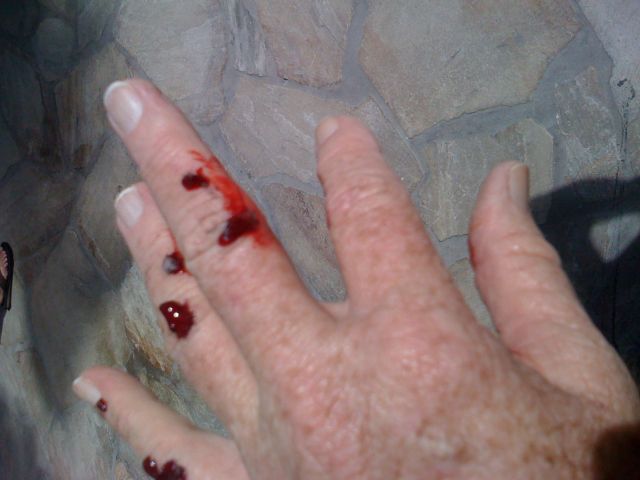
Gregory Worthington stopped as he was about to enter the house. A bloodcurdling scream rent the hot afternoon air. His sudden pause made the house agent hard at his heels walk onto the backs of his shoes.
‘I’m so sorry,’ she said.
The writer looked back. ‘I’m sorry,’ he repeated foolishly. ‘What was that?’
‘What?’
‘That scream. Did you hear a scream?’
‘It’s children playing in the fields.’ She made a gesture to hurry him on. Worthington stopped abruptly again, grazing his knuckles on the flaking limestone wall. A streak of blood stayed on the stone. ‘Ah! Oh dear, I’m afraid I’m making a mess, Mrs Fri… uh, Mrs Ferg–’
‘Friggieri,’ she said. ‘Look, Mr Worthington. This is a bad omen. Perhaps you’d rather have the house we saw this morning.’ She frowned, muttering under her breath about the man’s bleeding hand. ‘Sinjal hazin,’ she said, ‘it’s a bad sign,’ and looked at spattered blood on the threshold.
The writer tried to stem the quick red flow from his hand. Clumsily, he took a handkerchief from a pocket and wrapped it around three fingers. ‘No, no,’ he insisted, a touch too loudly. ‘I want to see this one. I like the uh … the atmosphere.’ What he liked was the solitude. Set away from others in the alley, the house stood alone, bounded on one side by a prickly pear hedge and on the other by a rubble wall from whence came the sounds of scrabbling and cackling.
‘Perhaps you would rather live in a seaside town. Not many tourists come here.’
‘I am not a tourist, Mrs Friggy,’ he said. ‘I am a writer, and I need the peace, the solitude.’ His last two words were muffled by a motor scooter whizzing up the lane. He thought he heard another scream in the distance. It was a shrill scream, a shriek, nothing like children playing at all. ‘Did you hear that?’ he asked.
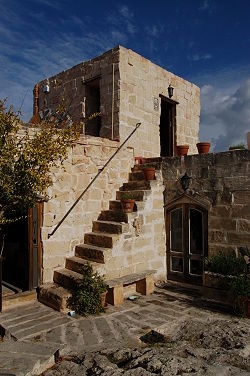 ‘What?’ The house agent was unwilling to even
listen.
‘What?’ The house agent was unwilling to even
listen.
The writer looked at her strangely. She had irritated him all day, but intimidated him at the same time. He wanted nothing more than to get rid of her, but not at the cost of renting something he would not be able to work in. ‘Never mind,’ he said brightly. ‘Let’s look inside, shall we? My hand is all right now.’ It was not quite all right. It smarted sharply and he knew it would begin to throb unless he dressed it rather soon. The heat, sweat and dust would not help to keep it clean.
‘That’s not a good omen,’ said the plump woman ominously. ‘Spilling blood on the doorstep like that. Are you sure you want to see this house?’
Gregory Worthington was seized by an immediate desire to take the house unseen, just to be awkward, just to prove to this annoying little woman he cared nothing for her omens. ‘I like the outside. Show me the rest.’
Mrs Friggieri strode inside, and he followed. It was cool and dark, quiet, smelling slightly of mildew. Without preamble, the agent walked into a large kitchen, hurried to the sink and turned on the tap. A clanking of pipes announced the arrival of a fierce shot of water. The tap spluttered. ‘There! Isn’t that something? Just a few years ago, you didn’t take water for granted in Malta. Look at this – fresh water, just like that!’
The writer had not spent the entire day with this woman without learning that everything she said was a political statement. ‘Indeed,’ he said, trying not to encourage her. He walked about, taking in what he saw.
‘A large kitchen, as you can see. Plenty of room for a good fridge.’ The agent walked on. ‘And two bedrooms of good size. Shutters on all the windows.’
‘What’s out there?’
‘A garden – nothing much.’ They went through glass doors into a courtyard tiled in red and white, and came to a gated archway. A new length of chain with a stout padlock held the gate together.
‘Do you have a key?’ asked the writer. The more he saw, the more he knew this was the house he would rent for the time he was on the island.
The woman dangled a key she separated from the rest on the tag she held. Her eyes never left his. ‘Later, later,’ she promised, teasing. ‘I know you like the house already. I saw you looking at the straight walls and the nice shutters on the windows. Good shutters are important, sir.’ Again she smiled, the beginning of a small laugh making her round shape wobble slightly. ‘This heat, this bright sunlight. It’s crazy to be out at this time. We should be lying down, having a rest.’ Then she blushed brightly, like a teenager.
‘It’s mad dogs and Englishmen weather, I suppose.’ Gregory Worthington said chivalrously, reduced to platitudes to save her from embarrassment. He was becoming curious about the garden gate. Why was it padlocked?
‘And which part of England exactly …?’
‘Not England at all, I’m afraid. I’m from Perth. Australia. I – uh.’ He fumbled with the straw hat. The afternoon sun slanted in yellow streaks at their feet as they walked. Gregory Worthington wiped his forehead. His hand came away damp and salty. He wiped it quickly on the handkerchief twisted around his bloody knuckles and looked down at his creased dusty trousers. It was entirely silly to wear a suit. It had become grubby, and a dark spot of blood now stained the jacket. Short-sleeved shirt and slacks would have been more sensible.
As if reading his mind, the woman said, ‘You will soon get used to the heat. After all, it is only the beginning of July!’ She stopped suddenly, causing the tall man to run into her heels again. His irritation rose afresh, but decided this time to be more assertive and decisive. After all, he was going to be there for some time. On his comfort and satisfaction depended the outcome of his next release. It was months, too many months since he had appeased his publishing house in Melbourne. This project was a desperate one, an urgent one, necessary to prove that Gregory Worthington was still writing, still writing well and making money for Cross & Ormondsey, publishers, Melbourne, Australia. And for himself of course, but it seemed not to matter as much at the moment.
The woman was rambling on again, ‘This house has not been lived in for some time. Still, it has good shutters, some furniture – remember, you must always get your own fridge and cooker – and excellent plumbing.’
He smiled, a bit indulgently.
‘Ah!’ the woman snapped, taking advantage of the small smile and turning it into her selling ploy. ‘You really like this place, I can see. Come, we will look into all the rooms and you can decide on one to write in. You said you were a writer. Which paper?’
Gregory found he had to apologise once more, damning his inability to take the upper hand with this woman. ‘Um – I am not a journalist. I –’ He did not know what to say without seeming pompous. He had never encountered such difficulty before. ‘I write books, Mrs Frigg–’
‘How nice. How
interesting. You must have quite an income, like Francis Ebejer.’ Gregory
knew of the island’s English
language novelist. He even had a glimpse of the tall eccentric in Valletta,
pointed out by a taxi driver. ‘That is Francis Ebejer,’ the driver said. ‘Like
you, sir. He writes books. It makes him money.
He doesn’t have to work!’
Gregory Worthington smiled wryly, thinking of the hour upon hour he spent agonising over a particular tract. Or rewriting what appeared to be perfectly acceptable prose for a publisher who always knew better. Now, he wished he had never told the taxi driver or Mrs Friggieri why he was on the island and why he needed peace and quiet and a secluded place to work. But these people had a way of prising words out of him.
Back in the kitchen, he was shown a vast deal table
and four unmatched chairs,
but he was more interested in the
small tiled courtyard. The open space was crowded with clay pots of philodendrons, some choked with weeds. He looked again at
the wrought iron gate locked with its length of chain, and a low wall that emitted the twitterings and
scrapings of fowl. 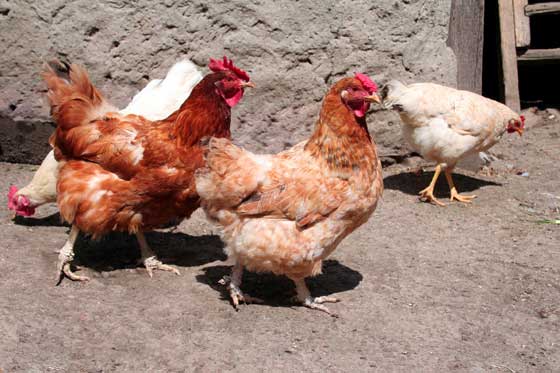
‘There are chickens,’ said the woman, eagerly turning the sound into a selling point. ‘And turkeys, I think. Someone from the village has been feeding them over the wall.’ Gregory Worthington had a vision of a young countrywoman throwing kitchen scraps over a rubble wall into a chicken run full of brown scrabbling hens. He had no idea how accurate his mind picture was.
‘Never mind the outside – it is too hot and dusty.’ The agent waved a dismissive hand. But the writer was intrigued by the wrought iron gate, the new length of chain and brass padlock. ‘Is there more garden?’ he asked.
‘Oh, look, here’s that key,’ Mrs Friggieri humoured him like a petulant child. ‘Perhaps we’d better have a peep, since you are so interested. Your nearest neighbour, by the way, is the president of the local band club.’ She said the sentence with pecuniary intention, rather than pride, but it was as if to acknowledge the status he would have in the village. ‘There is also a young village doctor and his family. The chemist, who is a woman –’ This she said with a smile and a raised eyebrow, as if she expected him to take up a feminist debate, or as if to state implicitly that the island was by no means backward in that regard. ‘– And of course Doctor Phineas Micallef, who is retired.’
Her quick dramatis personae ended with a sniff that seemed to indicate disapproval of the last character mentioned, but Gregory could not be sure what he found in the plump agent’s voice, and he was certainly in no state to ask questions of an inquisitive nature. Besides, he was half listening for another scream. It never came. Perhaps it was his imagination. Or cats. That was what he knew the wily agent would say if he mentioned it again. The woman seemed anxious to finalise the rental. She spoke about the village again, and its people. Leading the writer out into the bright sunlight, she waddled towards the padlocked gate. The thin disapproving line her mouth made at the mention of the retired doctor widened suddenly when the key worked immediately and they were let out into a small weed-grown field. Immediately to the right was a sunken area, flag-stoned and crowded with more weedy terracotta pots, reached by a set of concave steps. The steps were in a slant of shadow, and all but hid a small green door whose paint was faded and peeling away.
‘That door has no key,’said the woman, anticipating the man’s question. ‘And no one has ever shown interest in opening it, but inside is probably a small cellar. You have plenty of storage space in the house – a man on your own. I wouldn’t bother with the cellar. Dark and damp …’ she turned lightly on her heel and led the way back to the house, reeling off a list of figures and prices and times. The tall man had a hard time trying to listen and remember. It turned out the rent for the small farmhouse, as the woman kept calling it, was quite affordable.
‘These are the bedrooms.’ She opened narrow doors in a corridor into two cool darkened rooms.
In one of them, Gregory saw the white wraith of an iron double bed. All the back and side rooms except one were paved in large limestone flagstones, scrubbed concave and porous, with remnants of shiny oiling in the corners. The larger bedroom was tiled with yellow ceramic squares, some of which were loose and uneven. The room seemed cooler than the others. ‘I can give you a cheque immediately,’ he found himself saying.
‘So you want it!’ she exclaimed.
Gregory raised his eyebrows at her feigned surprise. Perhaps she was prepared to trail all over the small villages in the south west of the island all afternoon.
‘Like I said, it’s been deserted for some time, I don’t really know why.’ The way her mouth twisted said a very different story. This woman knew very well why the property was vacant. She was just not telling. He had no doubt what attracted him to the place: it was that no one else seemed to want it. The automatic selling words from the woman continued to come in spite of the fact the man remained silent. He wanted her to stop. To go away. After all, she had convinced him. What else did she want?
But the woman continued. ‘… So perhaps someone should come in and do some thorough cleaning for you. It will be some time before you can have a telephone connected, but there is always the café in the village, and the police station. There is no mailbox. I think a person of your profession –’ she raised an eyebrow and smiled conspiratorially, as if it were an occupation of doubtful moral worth, ‘– must receive many letters and things. Perhaps we can have a flap cut in the front door.’ She trailed off, mumbling she would try to make arrangements.
Moving in was uneventful and easy. Gregory, although he would never have mentioned it to Mrs Friggieri, intended to do all the cleaning himself, despite the throbbing from his cut knuckles. It may have been a silly decision at his age, he found himself thinking, as he splashed buckets of water onto the courtyard tiles, sweeping with long strokes until the water took most of the dust away with it. But he needed the exercise and the distraction, the work he accepted as penance for his present inertia.
Evaporation was almost immediate in the afternoon sun, and he resolved to find an earlier time during the day for his chores. Gardening would be a pleasant diversion from writing: if indeed he ever did start to write. His cases were half unpacked in the larger bedroom. He found a good mosquito net in a wardrobe behind the door. The windows had no insect screens, something he wondered about after a lifetime in Australia. The climate, things Maggie had said: they all somehow indicated a range of similarities between the country of his birth and this strange Mediterranean island where the only thing he found to be predictable so far was the weather.
The computer arrived by van from Valletta and was installed in the second bedroom, which only served partly well as a writing room. Its window faced the narrow lane. To look across the back, to have a flat view over the weed-grown field and own all the sunsets: that was what he would have liked.
It took him an entire afternoon to shift rooms. The double bed gave him a lot of trouble, so he eventually collapsed and took it apart, and re-erected it in the smaller bedroom, where he had to push it up in the far corner under the street window. His writing room was now the larger room with its massive oiled beams, recessed shelves in thick walls and uneven yellow-tiled floor.
He did not realise he would miss a telephone so badly, but supposed it would save him a lot of money having to think and decide and time his calls, after a walk up the long lane, which turned into a steep street at the top. It took him one simple walk to discover the lay of the small village. There were two cafés, one of which was called Il-Hanut and also sold wine. The police station still sported a blue lamp over its threshold from colonial days. The constable was affable but quiet and allowed him use of the single black telephone with no remonstrance, telling him that when the station was closed, he could always try the booth at the crossroads, but he did not know how often it was in working order. The resigned smile and friendly open-handed gesture was what Gregory had come to expect of Maltese people. He knew it hid a shrewd and calculating character that analysed and dissected strangers and fellow citizens alike, but friendly form and congeniality preceded and replaced all other demonstration.
‘And remember, you have to book calls to Australia!’ It was a while after the policeman’s parting shot before Gregory realised he had not told the man where he was from. Perhaps it was his accent? Or had word already got around that a strange writer from down under had come to this small Maltese village to try and write something to rescue his reputation and career?
‘Something like the second book. Something dark and foreboding and full of suspense like The Altruist. Something to chill readers back into a following.’ That was what Paul De Souza said at their last meeting. Cross & Ormondsey needed more suspense and mystery from Gregory Worthington, more crime and horror, if he could. The last was said sarcastically, the stress on the hypothetical turned into a virtual insult by the publisher. So Paul thought he had lost it.
So Paul thought Gregory no longer had the staying power or the imagination to turn
out another Altruist, which won the Premier’s award two
years ago. So Paul thought it was all finished for a writer who, at forty-five,
had found himself in the grip of doubt and inertia.
Gregory was fully installed in a few days. The heat and dust continued unchanged. Someone said he should not expect change until September, when the moist winds would blow; the humid winds laden with rain that would fall in torrents; hopefully where it could be caught and stored. But the writer was from Australia – was it not just as hot there? Gregory smiled at the repeated interrogation from inquisitive strangers. They were friendly, peaceful and polite, but they asked a thousand questions each. He found himself repeating the story of his travels and of his ‘life’ – whether he was married, whether his children had grown up – to a dozen different strangers. The shopkeeper who sold him groceries. The haberdasher, who happened to be the only newsagent in the village. The butcher, who told him not to eat pork in summer. And of course the man behind the bar of Il-Hanut.
He had spoken, on his third or fourth visit to the wine shop, of the delivery of his appliances; a small gas cooker, a large fridge and a motley collection of small things such as a kettle, a toaster and a small coffee percolator. He found that whatever he said, conversation in the shop would halt, and all present would listen to his words, interjecting politely in English when he was finished.
‘I hope you did not give them a big tip!’
‘Remember not to trust your gas pipes.’
‘Keep candles for blackouts!’ The last came from a wizened old man who turned out to be the bass drum player in the village band. He was also the village drainage plumber, much in demand because of the decrepit state of the pre-historic maze of clay pipes lying beneath the dusty streets.
After someone pointed him out and described the way he earned his livelihood, Gregory would often see the plumber weaving about the village streets, carrying a bunch of long canes and attachments with which he would unblock underground pipes after lifting the limestone lid of the ‘spuk-shin’. Gregory smiled at the abbreviated English terms turned vernacular. This one, for inspection cavity, was to become one he himself would use. The men spoke among themselves in Maltese, a jolly guttural language with loud stressing and embroidered with much head moving and gesticulation. They drank sweetened tea and coffee laced with rose water with as much fervour as they knocked back tumblers of beer and thick red wine. Its scent was heavy in the close space of the shop, and Gregory soon became familiar with their way of paying for rounds. Because he was still a stranger and ‘English’, he was not allowed the honour of paying for one himself for some days. They spoke to him in friendly snatches of conversation, composed mainly of curious questions about his solitude, his writing and whether he went to church. They held a strange monopoly on Catholicism, Gregory found, and were surprised and full of disbelief to hear of the existence of Australian Catholics with similar habits to theirs.
‘Is this some invented tale you tell us, Mister Writer?’ asked a member of the group, a particularly vociferous debater when it came to politics.
‘No, no,’ protested Gregory. And he was saved from having to debate on Irish, Australian and Maltese religious observances by another loud conversation taking place just outside the café. He escaped unnoticed in the hiatus, finding the street cooled, the sun gone away and a bevy of small children playing with a ball outside his front door.
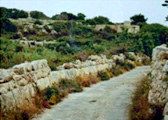
Morning noises were country noises, interspersed with the buzz of motor scooters in the lane, the drone of aeroplanes from the nearby international airport and a high hum someone told him came from the limestone quarries outside the Southern villages. So now he knew the provenance of all that dust. Gregory looked at the scab on his hand. It was the only reminder now of his first days on the island.
He was used to the dust now, and the noise. It was a background din, punctuated frequently by shrill yells from nearby streets. Alarmed at first, thinking it was a repetition of the screams he had heard that first day, Gregory would look out of his front windows and find the conversation, shrill as it was, to be a friendly exchange between women shouting from one end of the lane, or from one corner of a street, to another.
One afternoon, a sawing sound came from his own front door. A lad of about fourteen was hacking a hole in the thick wood.
‘Letterbox, sir!’ The smile was wide and infectious. 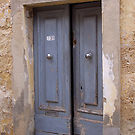
‘A slit, you mean. The mail will fall on the floor on the inside.’
‘Oh no! I have this for you.’ Out of a plastic bag the lad produced a metal box, which he soon fixed onto the inside of the front door to catch letters. Gregory was informed deliveries would occur every day, including Saturday mornings. ‘But you must fix that,’ said the boy, pointing to the faint barely legible number six painted above the fanlight of the front door.
It would be a while before Gregory obeyed the boy’s instructions and found a brush suitable for the small job. The chicken run provided a background of noises and scrapings. There were nine brown hens and three larger fowl Gregory took to be turkeys, never having seen one that had not been denuded of its feathers, stuffed and roasted. They were largely silent, uttering a low gobbling only when they were angered or chased into a corner while Gregory placed a dish of kitchen scraps or bran mash in the middle of the run. He topped up a wide tin pan of water from the kitchen tap.
Another tap he found on a pipe in the yard, just above the hollowed steps to the sunken yard, turned but produced nothing. Occasionally, Gregory found a scattering of someone else’s scraps littering the run when he looked in. Obviously the habit of feeding the abandoned fowl was established, and some well-meaning neighbour was still fulfilling the task.
‘You fat birds!’ Gregory found himself mumbling. ‘Perhaps someone should thank your benefactor.’ He had still not sat at the table in the back room that held the new computer. He attended to a multitude of domestic chores and tasks, which included finally the touching up of the number six over his front door. He moved all the plant pots in the courtyard and space in front of the cellar door out the back, and swept around them.
He cleaned the windows with balled up damp newspaper, as he saw village women do, and polished the brass knocker with liquid he found under the sink, much to the hilarity of a passing woman.
‘You do your wife’s work, eh?’ she laughed as she went by, expecting no
answer.
Gregory found himself
thinking cynically about Maggie. Polishing brass knockers was never
her work. He replaced the bottle of
polish under the sink and, still squatting, thought of his estranged wife in
Australia. Maggie. Loud and bright and
full of laughter and song, she was. Her quick passion was startling, and
the easiest emotion with her was anger. Fights. He needed
little imagination to conjure what she would be doing in Australia now.
He looked at his watch automatically, thinking at the same time he made the quick calculation of time difference, about how long it had been since he last thought of her in that way. In any way.
‘Sick! Terrible, Greg. All you can think about is blood and gore. Yuk. I couldn’t finish your books if I tried. Whatever possesses you to write like that? Yuk,’ she repeated, screwing her face and banging the paperback edition of his second book down.
It had not always been like that. Once she liked everything about him, including his writing. Perhaps she came to use insults and disparagement as weapons. Weapons that worked. Her attacks on his writing continued until he could do either of two things. Stop work or go away and do it somewhere else.
Paul De Souza had shown him there was really only one alternative. ‘Come on, Greg, face it. What can you do besides write? Teach? Mate, be realistic. You have a readership. People have come to expect this stuff from you.’
Maggie called it stuff too. They were probably right: Gregory would be totally misled to entertain thoughts that his works approached literary achievements. They were popular novels; they were commercial horror stories. They were sensationalist trash. He stood in the semi-darkened kitchen and drank a glass of tepid tap water with an automatic gesture. It tasted heavy and metallic, but he remembered the words of the agent who let him the house. It was nothing short of a miracle he should have running water at any time of day. Or perhaps it was not. Perhaps it was not sensationalist trash.
He thought of
the many arguments and debates he
had with Maggie about his writing;
how she grudgingly supported him
at first, even when she expressed distaste. ‘Is it your aim t o send shivers
down the spine of every reader?’ she
asked once, her sarcastic
question reaching him from across their Perth apartment, where she was riffling
through a draft copy of The Altruist. It was a difficult afternoon; a hot and
humiliating one when he threw open all the windows to catch a breeze, to cool his
brow that had started to bead from
the humidity, or
from something inside him. Her
high voice was filled with criticism, then anger, then accusation.
She did not stop when he fell into silence himself. She shouted flippant
but sharp abuse,
hurling sentences at him in a loud voice until they heard ‘Ssh!’ coming
from one of the other apartments.
o send shivers
down the spine of every reader?’ she
asked once, her sarcastic
question reaching him from across their Perth apartment, where she was riffling
through a draft copy of The Altruist. It was a difficult afternoon; a hot and
humiliating one when he threw open all the windows to catch a breeze, to cool his
brow that had started to bead from
the humidity, or
from something inside him. Her
high voice was filled with criticism, then anger, then accusation.
She did not stop when he fell into silence himself. She shouted flippant
but sharp abuse,
hurling sentences at him in a loud voice until they heard ‘Ssh!’ coming
from one of the other apartments.
Gregory knew neighbours had heard every word. They also heard Maggie’s subsequent loud exclamations when they made up, the shrill laughter and delight in her own attempts at reconciliation.
Only the eventual success of the novel took some of the remnant embarrassment away. Did he remember her properly? Gregory stood at his own kitchen window, staring at the neat courtyard he had swept the day before. Did he picture Maggie as she really was? Small head. Red hair cut in a very short urchin style that accentuated wide eyes and small pixie ears, from where large colourful earrings swung. The swinging of red, yellow or gilt earrings always managed to stress the gravity or levity of what she said. Her anger was always pulsed by the swaying of rainbow earrings.
Was she still like that? Although they spoke on the telephone as recently as a week before he left for Malta, he had not seen Maggie for almost seven years. After the separation, she had taken her ‘things’, as she called most of the contents of the flat, which included their daughter, and returned to Melbourne.
‘I am not going to let her grow up reading that lurid stuff!’ was one of the last things he watched her say.
Gregory drank another small glass of metallic water and walked
to the back room clutching the empty
tumbler. The computer on
the small table, the blue pack of paper near the printer, the mug full of yellow pencils – they all
stood in a neat assemblage that attested to the absence of work. Gregory was
not a neat worker. He would screw paper up and break pencils. His desk would
quickly become  a massed heap of letters and books and papers once he decided to work. He would
riffle through reference works, scribble in the margins of newspaper articles
and rip notebooks to shreds when in the
height of composition.
a massed heap of letters and books and papers once he decided to work. He would
riffle through reference works, scribble in the margins of newspaper articles
and rip notebooks to shreds when in the
height of composition.
He thought of his notice board in the Perth flat after Maggie left. It was full of pinned notices and messages, torn newspaper and cards long out of date. He remembered letting his gaze sift through the collection of words there for a start – a trigger – the suggestion of an idea.
